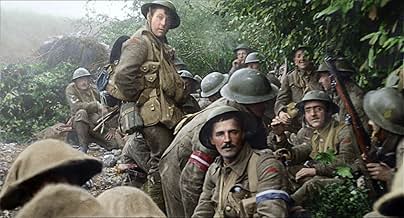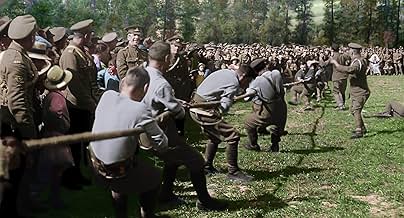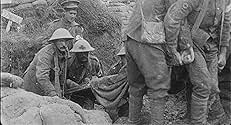IMDb RATING
8.2/10
40K
YOUR RATING
A documentary about World War I with never-before-seen footage to commemorate the centennial of the end of the war.A documentary about World War I with never-before-seen footage to commemorate the centennial of the end of the war.A documentary about World War I with never-before-seen footage to commemorate the centennial of the end of the war.
- Nominated for 1 BAFTA Award
- 6 wins & 14 nominations total
Thomas Adlam
- Self - Bedfordshire Regiment
- (voice)
- (as Capt Thomas Adlam VC)
William Argent
- Self - Royal Naval Air Service
- (voice)
- (as LM William Argent)
John Ashby
- Self - The Duke of Cambridge's Own (Middlesex Regiment)
- (voice)
- (as Cpl John Ashby)
Attwood
- Self - British Army
- (voice)
- (as Cpl Attwood)
Walter Aust
- Self - East Yorkshire Regiment
- (voice)
- (as Pte Walter Aust)
Donald Bain
- Self - Seaforth Highlanders
- (voice)
- (as Pte Donald Bain)
Thomas Baker
- Self - Chatham Battalion, Royal Naval Division
- (voice)
- (as Pte Thomas Baker)
George Banton
- Self - 50th Division Headquarters
- (voice)
- (as Sig George Banton)
Walter Becklake
- Self - Northhampyonshire Yeomanry
- (voice)
- (as L Cpl Walter Becklake MM)
Arthur Beeton
- Self - Royal Navy Air Service
- (voice)
- (as POM Arthur Beeton)
Robert Bell
- Self - British Army
- (voice)
- (as Mr Robert Bell)
William Benham
- Self - Hawke Battalion, Royal Navy Division
- (voice)
- (as Sub Lt William Benham)
Joseph Biglin
- Self - Durham Light Infantry
- (voice)
- (as Pte Joseph Biglin)
Edwin Bigwood
- Self - Worcestershire Regiment
- (voice)
- (as Pte Edwin Bigwood)
Horace Birks
- Self - Tanks Corps
- (voice)
- (as Capt Horace Birks)
Edmund Blunden
- Self - Royal Sussex Regiment
- (voice)
- (as Lt Edmund Blunden MC)
Clarence Bourne
- Self - Army Service Corps
- (voice)
- (as S Sgt Clarence Bourne)
Allan Bray
- Self - The Duke of Edinburgh's ((Whiltshire Regiment))
- (voice)
- (as L Cpl Allan Bray)
Featured reviews
100 years on from the Great War we cannot pretend to know what life was like serving in the trenches. This incredible film brings us as close to experiencing it as we are ever going to get.
It is harrowing, it is poignant, it is funny. Above all else this film is heartbreaking. No punch is pulled, no attempt is made to hide the brutality of war or the hardship of the common soldier.
Quite simply this amazing documentary should be made compulsory viewing in all schools and for every soapbox, warmongering politician that would send our youth into hell.
It is harrowing, it is poignant, it is funny. Above all else this film is heartbreaking. No punch is pulled, no attempt is made to hide the brutality of war or the hardship of the common soldier.
Quite simply this amazing documentary should be made compulsory viewing in all schools and for every soapbox, warmongering politician that would send our youth into hell.
Utterly haunting movie of life on the western front in WW1. Peter Jackson has thrown some serious computer firepower to bring these soldiers back to life.You will have never seen anything quite like this before.Breathtaking in many parts!
10mattwidd
I was lucky enough to bag a ticket to the one off showing of Peter Jackson's They Shall Not Grow Old, having watched a lot of World War One documentaries and made countless visits to historic sites across France and Belgium I was keen to see what was being marketed as a 'new' perspective on The Great War, it did not disappoint.
Jackson chose to create a narrow focus narrative for this 1 hour 30 minute documentary to allow the viewer to delve into the fine details often missed in more sweeping documentaries trying to cover all aspects and areas of the conflict. Jackson chose to look closely at the lives and experiences of British native frontline troops in Belgium. The documentary follows a linear timeline beginning with the breakout of war and the initial volunteering of thousands of young men excited and ready for an adventure for King and Country and ends with the great sense of loss and uncertainty of the future the troops had by the end of the war.
The entire documentary is narrated by records of surviving troops recorded in the 60s and 70s, this was an intentional move by Jackson that definitely adds to the ability for the viewer to connect and relate to the survivors.
I especially found the stories and anecdotes about the goings on behind the lines during down time and R&R for the troops captivating as it is often over looked in other documentaries solely concentrating on the combat and horrors of war.
The pain staking effort and lengths Jackson and his team went to to restore this footage not only with colour but with frame rate, sharpness and especially sound is breath taking. Taking the time to have professional lip readers painstakingly review all the footage so allow us to then know and hear what was being said truly brought the footage to life.
My only issue with the film, something that is made note of by Jackson is of course because of the time in history and available cameras there is no actual combat footage available so you do spend a large amount of time just watching still hand drawn cartoons of the battles from the time, something that cannot be avoided but does detract from the immersion the rest of the film creates.
I highly recommend this film to everyone, it is important we see the true perspective of what our ancestors went through and never forget these brave men and women.
A century later, Peter Jackson produced an informative and fascinating documentary about the First World War, seen by the English, in the trenches of the Bay of Somme, with dusted and colored archive images.
Almost everyone expected a brief and victorious war, which, as it was said at the time, would be "over at Christmas". The continuation was very different and became a trench war. Hygiene was deplorable until it became laughable but the atmosphere within the troops was fraternal despite the constantly oppressive atmosphere.
And we also learn that the English infantrymen regularly had a mission to capture a Fritz. Knowing that from a military strategy point of view, this is a complete nonsense, a war prisoner being systematically an useless and cumbersome dead weight, it is perhaps a pity that this documentary does not give to the audience an explicit explanation. And the only rational explanation is probably this one: to force the English infantrymen to attack the Germans, the prisoner of war being the proof of the effectiveness of their attack ...
Almost everyone expected a brief and victorious war, which, as it was said at the time, would be "over at Christmas". The continuation was very different and became a trench war. Hygiene was deplorable until it became laughable but the atmosphere within the troops was fraternal despite the constantly oppressive atmosphere.
And we also learn that the English infantrymen regularly had a mission to capture a Fritz. Knowing that from a military strategy point of view, this is a complete nonsense, a war prisoner being systematically an useless and cumbersome dead weight, it is perhaps a pity that this documentary does not give to the audience an explicit explanation. And the only rational explanation is probably this one: to force the English infantrymen to attack the Germans, the prisoner of war being the proof of the effectiveness of their attack ...
It's only October and I have already seen two Oscar winning films. This (for best documentary) and A star is Born for loads of things.
Months ago I bought a ticket for this special live (3D) screening of this BFI film from the London Film Festival featuring a post film interview between Peter Jackson (the most modest man in cinema) and Mark Kermode (the most adulatory)
I thought it would be special.
It was more than that.
It was a landmark.
It was actually a significant night in cinematic history, because what Peter Jackson has achieved here is unparalleled.
We've all seen colourised war footage. It's interesting, but in reality it's a bit pants.
This is the real deal. A step forward in technology driven by heart, emotion, passion, DNA.
In this truly remarkable documentary Jackson brings us footage from the WW1 front line trenches in a way that you can't even begin to imagine.
First he restored hours of black and white footage to remove grain, scratches, burn marks etc.
Then he graded it.
Then he fixed all the film sprockets so they don't jiggle about and blur.
Then, get this, he turned it all from a hotch-potch of 10/11/12/14/16 and 17 Frames per second into it all being 24 FPS.
This is not insignificant.
A 17 FPS film transferred to 24 frames needs to 'find' 7 frames. It needs to create them, to fill in the gaps to make film flow as we expect. How one does that I have no clue. Frankly, neither does Jackson, but he knows people who were up to it and deliver on the challenge.
So, as Jackson puts it, we don't see Charlie Chaplinesque war footage. We see dignified film of soldiers in real time as our eye would compute it. This is important because it makes it so real.
Then he, frame by frame, colourised the whole lot.
Then he put a team of lip readers onto it to work out what the soldiers were saying when they spoke to camera (in 1914-18 there was no film/sound recording).
Then he recorded both battleground sound effects, by enlisting the NZ army, and the words these soldiers were saying, through actors, and lip synched and background-noised the whole thing.
Then he launched it.
The man is a genius.
The result is beyond words incredible.
On many occasions I gasped out loud, not least when he moved from the first reel, which shows unmodified footage of the preparation of enlistees for WWI, into the reality of war.
In a stunning coup de theatre the screen changes shape.
The audiences audibly gasps.
We are in a new reality.
Now, this all makes it sound like this is simply an exercise in technological show-offery.
No. this focuses on soldiers. Poor. Young. Men.
With terrible teeth, but with opinion, with humour, with dignity, with resolute spirit.
And not just young British men.
Perhaps the most affecting part of this film is where German POW's muck in and join the Brits. It's clear that in those days this was duty and honour for one's country, absolutely NOT hatred of the enemy.
This is a truly remarkable film experience.
It's important.
Find a way of seeing it.
It's much more than a cinematic landmark.
It's a historical one, because the legacy Peter Jackson's 14-18-Now and Imperial War Museum commission gives the world is new technology that will allow all sorts of ancient film archives to become living history.
In this case the 100 minutes that are committed to film are actually backed up by a further 100 hours of monochrome footage that Jackson's team has restored (free of charge) for his commissioners.
See when international honours are handed out (I think Bono has a knighthood for example) Peter Jackson needs to be number one on the list for this real and important achievement.
I assume a further Oscar is in the bag.
Months ago I bought a ticket for this special live (3D) screening of this BFI film from the London Film Festival featuring a post film interview between Peter Jackson (the most modest man in cinema) and Mark Kermode (the most adulatory)
I thought it would be special.
It was more than that.
It was a landmark.
It was actually a significant night in cinematic history, because what Peter Jackson has achieved here is unparalleled.
We've all seen colourised war footage. It's interesting, but in reality it's a bit pants.
This is the real deal. A step forward in technology driven by heart, emotion, passion, DNA.
In this truly remarkable documentary Jackson brings us footage from the WW1 front line trenches in a way that you can't even begin to imagine.
First he restored hours of black and white footage to remove grain, scratches, burn marks etc.
Then he graded it.
Then he fixed all the film sprockets so they don't jiggle about and blur.
Then, get this, he turned it all from a hotch-potch of 10/11/12/14/16 and 17 Frames per second into it all being 24 FPS.
This is not insignificant.
A 17 FPS film transferred to 24 frames needs to 'find' 7 frames. It needs to create them, to fill in the gaps to make film flow as we expect. How one does that I have no clue. Frankly, neither does Jackson, but he knows people who were up to it and deliver on the challenge.
So, as Jackson puts it, we don't see Charlie Chaplinesque war footage. We see dignified film of soldiers in real time as our eye would compute it. This is important because it makes it so real.
Then he, frame by frame, colourised the whole lot.
Then he put a team of lip readers onto it to work out what the soldiers were saying when they spoke to camera (in 1914-18 there was no film/sound recording).
Then he recorded both battleground sound effects, by enlisting the NZ army, and the words these soldiers were saying, through actors, and lip synched and background-noised the whole thing.
Then he launched it.
The man is a genius.
The result is beyond words incredible.
On many occasions I gasped out loud, not least when he moved from the first reel, which shows unmodified footage of the preparation of enlistees for WWI, into the reality of war.
In a stunning coup de theatre the screen changes shape.
The audiences audibly gasps.
We are in a new reality.
Now, this all makes it sound like this is simply an exercise in technological show-offery.
No. this focuses on soldiers. Poor. Young. Men.
With terrible teeth, but with opinion, with humour, with dignity, with resolute spirit.
And not just young British men.
Perhaps the most affecting part of this film is where German POW's muck in and join the Brits. It's clear that in those days this was duty and honour for one's country, absolutely NOT hatred of the enemy.
This is a truly remarkable film experience.
It's important.
Find a way of seeing it.
It's much more than a cinematic landmark.
It's a historical one, because the legacy Peter Jackson's 14-18-Now and Imperial War Museum commission gives the world is new technology that will allow all sorts of ancient film archives to become living history.
In this case the 100 minutes that are committed to film are actually backed up by a further 100 hours of monochrome footage that Jackson's team has restored (free of charge) for his commissioners.
See when international honours are handed out (I think Bono has a knighthood for example) Peter Jackson needs to be number one on the list for this real and important achievement.
I assume a further Oscar is in the bag.
Did you know
- TriviaMuch of the footage had never been seen, having sat in the vaults of London's Imperial War Museum for many years.
- GoofsSeveral shots of tanks appear in the film, both Mark V (Mark Five) and Mark V* (Mark Five Star). They have been colourised green. In reality, tanks of these types were painted "a neutral brown colour". See the article by the British Tank Museum which states that. "Surrendering to the inevitable, towards the end of 1916 it was ordered that the tanks should be painted in a 'neutral brown colour' all over." These tanks entered service in 1918, and were factory-painted brown.
- Quotes
Soldier: [waving at camera] Hi, mum.
- Crazy credits"Filmed on location on the Western Front, 1914 to 1918"
- ConnectionsFeatured in Front Row: Episode #3.3 (2018)
- How long is They Shall Not Grow Old?Powered by Alexa
Details
- Release date
- Countries of origin
- Official sites
- Language
- Also known as
- They Shall Not Grow Old
- Filming locations
- Production companies
- See more company credits at IMDbPro
Box office
- Gross US & Canada
- $17,956,913
- Gross worldwide
- $21,656,913
- Runtime
- 1h 39m(99 min)
- Color
- Sound mix
- Aspect ratio
- 1.33 : 1(original footage)
- 1.85 : 1
Contribute to this page
Suggest an edit or add missing content
























